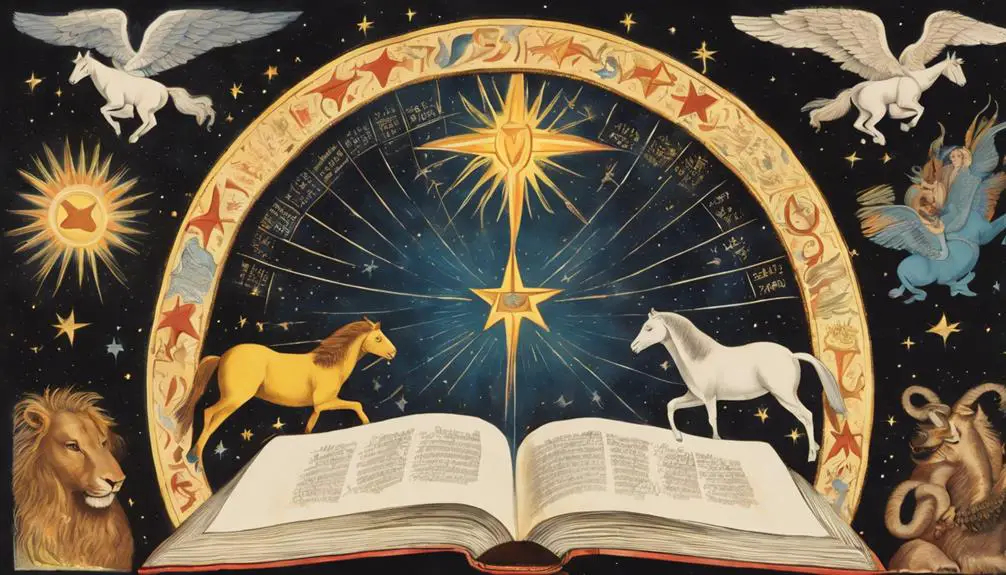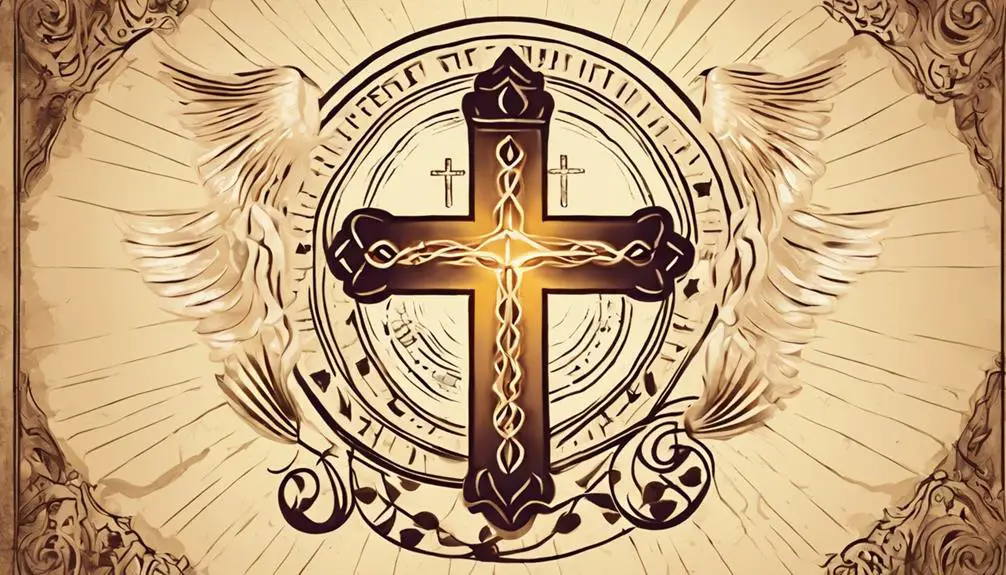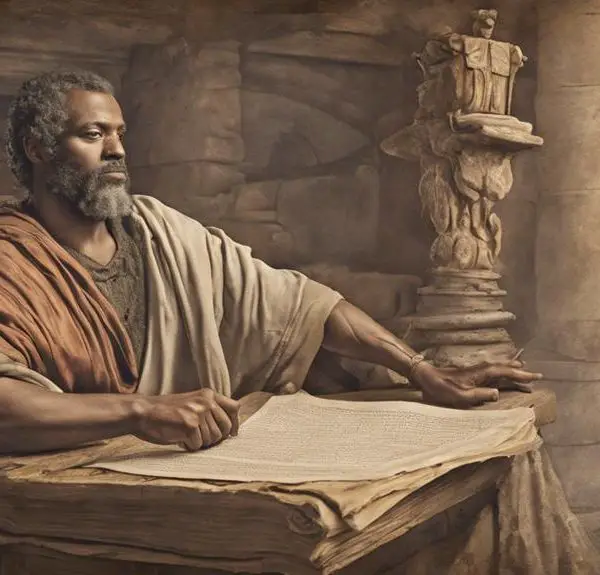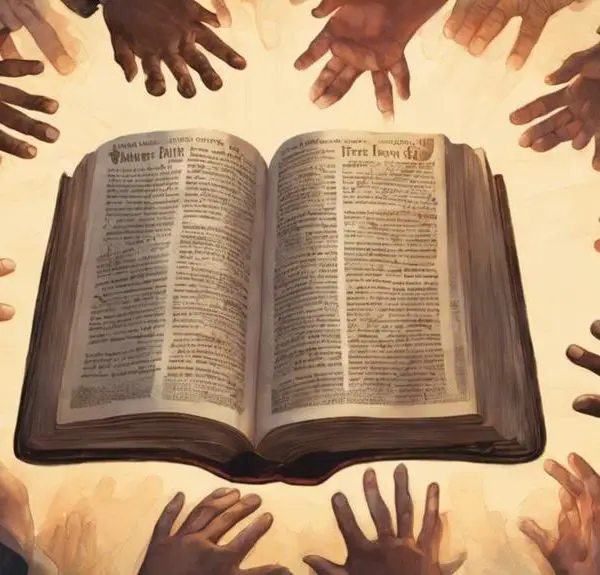Unearth the profound symbolism of Revelation in the Bible, a complex and influential text that has shaped Christianity in countless ways.

A Study of Revelation in the Bible
Just as a map guides you through unfamiliar territory, so too can an in-depth study of Revelation in the Bible help navigate its complex symbolism and prophetic messages.
You'll explore the authorship, historical context, and various interpretations across denominations. It's more than just an apocalyptic vision; it's a profound piece of literature that's shaped Christianity in countless ways.
Curious to understand its impact? Well, let's press on.
Key Takeaways
- The Book of Revelation, attributed to John the Apostle, was written as a symbol-laden message of hope during times of Roman persecution.
- The symbols in Revelation, such as the Seven Churches and the Lamb, represent theological truths and God's divine plan.
- Interpretations of Revelation vary among Christian denominations, ranging from symbolic struggles between good and evil to roadmaps of future events.
- The Book of Revelation significantly shapes Christian doctrines, rituals, and worldview, influencing eschatology beliefs and inspiring social and political movements.
Understanding Biblical Prophecy

To fully grasp the complexities of biblical prophecy, you must delve into the historical, cultural, and literary contexts of these divinely inspired predictions. Prophecies aren't just haphazard forecasts; they're divinely revealed truths steeped in complex allegorical language, metaphors, and symbolism.
You'll find that prophecies often reflect the socio-political realities of the times they were written in, presenting a critique or providing hope in the face of adversity. For example, the book of Daniel, filled with dreams and visions, is deeply rooted in the Babylonian exile context, offering hope of divine deliverance to the oppressed Israelites.
It's also crucial to recognize the literary aspect of biblical prophecies. They're not sterile, prosaic predictions, but poetic, richly metaphorical, and often apocalyptic in their literary style. This contributes to the depth and multilayered meanings of the prophecies, making them open to various interpretations over time.
Context and Authorship

Having explored the complexity of biblical prophecy, it's essential for you to understand the context and authorship of these scriptures to fully appreciate their significance. The book of Revelation, the last book of the New Testament, is a prophetic text. Traditionally, it's attributed to John the Apostle, exiled on the island of Patmos. However, there's scholarly debate regarding authorship, given the stylistic differences between Revelation and John's other works.
Understanding the context is equally crucial. Written in the 1st century AD, during a time of Roman persecution, the text can be seen as a message of hope for oppressed Christians. It's filled with imagery of judgement and ultimate victory over evil, comforting those facing intense struggles.
The context also influences its interpretation. The book was written in apocalyptic genre, a literary style that uses complex symbolism to convey its message. Hence, understanding the historical and cultural background helps make sense of these symbols, enhancing your comprehension of the text's meaning.
Symbolism in Revelation

Delving into the symbolism in Revelation, you'll find a rich tapestry of vivid imagery that's not only intricate but also profound, offering deeper layers of understanding to this complex biblical text. The symbols aren't simply metaphors or allegories, but rather, they're imbued with theological significance, designed to provoke contemplation and discernment.
Consider the following examples:
Symbol |
Meaning |
|---|---|
Seven Churches |
The completeness and universality of the Church |
Four Living Creatures |
The omnipresence and omnipotence of God |
The Lamb |
Jesus Christ, the Saviour, and his sacrifice |
Seven Seals |
God's divine plan and judgement |
These symbols, among others, weave a narrative that's rich with theological and eschatological implications. The number seven, for instance, appears frequently, suggesting wholeness and completeness. The Lamb, representing Jesus, embodies the themes of sacrifice, redemption, and victory over evil. The Four Living Creatures signify God's pervasive presence and unlimited power.
In Revelation, symbolism is a crucial tool, used not just for enhancing narrative richness, but also for conveying theological truths, inviting you to delve deeper and discover the profound messages contained within.
Interpretations Across Denominations

Differing interpretations of Revelation can be found across various Christian denominations, offering unique insights into this enigmatic biblical book. You'll find that Catholics, for example, view Revelation as a symbolic representation of the struggle between good and evil, while Protestants often adopt a more literal interpretation, seeing it as a prophecy of end times.
Within Protestantism, different branches also hold divergent views. Dispensational Premillennialists, largely found in Evangelical circles, interpret Revelation as a roadmap to future events, including the rapture and the tribulation. Historic Premillennialists, on the other hand, don't believe in a pre-tribulation rapture, asserting instead that the church will go through the tribulation.
It's critical to note that these interpretations aren't mutually exclusive, and many Christians blend elements from different approaches. Furthermore, Eastern Orthodox and some mainline Protestant denominations view Revelation not as a literal prophecy, but as an allegory of the spiritual path and the ongoing struggle between light and darkness.
Revelation's Impact on Christianity

Undeniably, the book of Revelation has wielded a profound influence on Christianity, shaping its doctrines, rituals, and the spiritual worldview of its adherents. As you delve into this profound book, you'll see the indelible impact it's had on the Christian faith.
Revelation's apocalyptic visions have driven Christian eschatology, shaping beliefs about end times. Its vivid imagery has seeped into liturgy, art, and hymnody, and you'll find its echoes in the stained glass of cathedrals, the verses of hymns, and the pages of theological treatises. The book's focus on divine judgment and redemption has informed moral teachings and ethics.
You'll also notice how Revelation's themes have fueled social and political movements within Christianity. Its call for faithfulness amidst persecution has inspired countless Christians during times of trial, and its message of divine justice has emboldened calls for social reform.
Conclusion
In wrapping up, you've explored Revelation's profound role in Christianity, considering its context, authorship, and symbolism.
You've seen how interpretations vary across denominations, emphasizing the complexity of biblical prophecy.
This knowledge deepens your understanding of Christianity's diversity and the power of Revelation's influence.
Always remember, approaching such texts requires reflective thought, respect for differing viewpoints, and a willingness to grapple with ambiguity.



Sign up